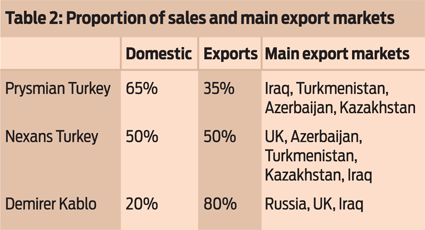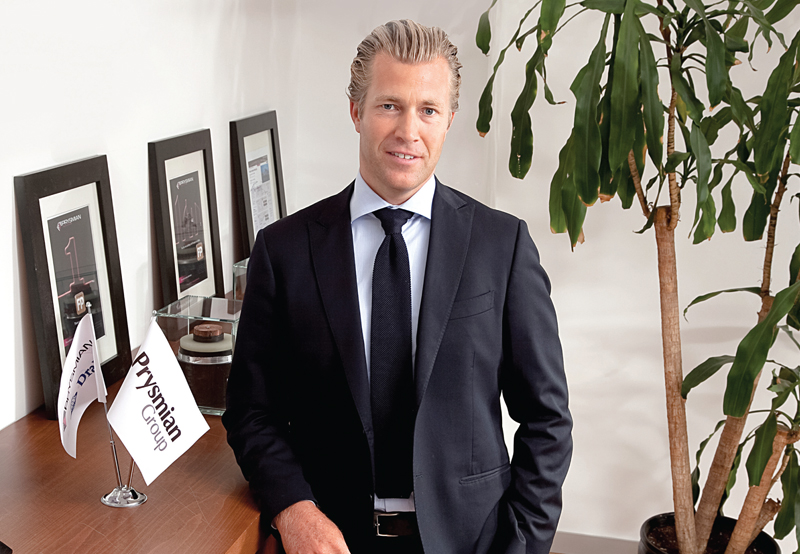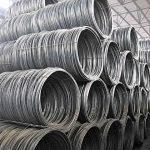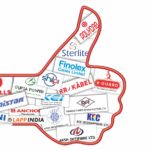During the 8th Wire and Cable Conference 2014 held at InterContinental Istanbul, Turkey, in June, Mr. Hans Hoegstedt, CEO, Prysmian Group Turkey presented an overview of the growth of the Turkish cable market including the macroeconomic and exchange rate issues faced in Turkey. In addition, some insights were given into the Turkish cable market: its structure, market segments, size, demand and likely evolution. Given below are some excerpts from this presentation.
Turkey has always been a key global manufacturing base and trading post due to its proximity to major markets and ideal geographic location. The country has seven direct neighbours as well as long coastline spanning the Black Sea and the Mediterranean Sea, giving it access to Europe, Africa, Central Asia and the Middle East. Wire and cable producers have long recognised this with three of the four top producers owned by foreign entities. These have either chosen to set up in Turkey or establish a base through acquisitions (see table 1).

Italy’s Prysmian Group is celebrating 50 years in Turkey this year. Its Turkish base was founded by Siemens and later bought by Pirelli, whose global operations were then acquired by Prysmian. Its Turkish operation makes up about 5 per cent of the Group’s total sales. France’s Nexans was set up in the early 1990s by acquiring two companies, one in Tuzla and another in Denizli. Its Turkish operation makes up just under 3 per cent of the Group’s sales.
Mass Kablo is owned by Saudi Cable Company, which took over Turkish producers Kavel Kablo in 1987 and Demirer Kablo in 1994. Both were merged into Demirer Kablo in 2005, which produces mainly MV and HV cable. While its prime geographic location is key, Turkey’s golden asset is its people. The country has a large number of highly qualified engineers and its people are renowned for their entrepreneurial spirit and positive attitude to work. This makes for a high-performing and flexible workforce. Joined up thinking allows companies with a global presence to leverage technical knowledge from overseas offices to supply the best solutions for their Turkish customers, especially in more high-end cable applications supplying power transmission, transportation and oil and gas segments.
“Prysmian is very much a local company in all senses of the word, with various know-how based in Turkey. For example, one of the Group’s 17 R&D centres is in Turkey. In addition, 12 of the top managers in our global team come from Turkey, including Prysmian’s CEO for North America,” explains Hans Hoegstedt, CEO, Prysmian Group’s regional office in Turkey. With half of its 76 million population below the age of 30, the country’s attractiveness to outside investors lies not only in is growing workforce but also expanding demand for telecommunications, energy and transport.
Exciting developments
There are some very exciting developments taking place in Turkey over the next three years especially with some major expansions in rail transport, energy and communications. Nexans is investing in its Turkish units in order to keep up with demand from the various sectors. Production is to expand by 20-25 per cent over three years at its Istanbul unit. Investment will be mainly dedicated to technology and equipment for cable production geared toward the energy sector. In the energy sector, wire and cable demand is expected to come from Turkey’s burgeoning nuclear industry as well as the renewable sector, especially from solar and wind turbines. Turkey currently imports a lot of its energy requirements to produce electricity. Recently published TEIAS data show the country’s electricity consumption rose by 78 per cent over the past 10 years from 131.9 billion kWh in 2003 to 235 billion kWh last year. In 2014, TEIAS estimates the country will consume 256 billion kWh of electricity. Turkish Energy Minister Taner Yildiz has been quoted saying that this impressive increase is the result of the improvement of welfare in the country and that Turkey “will nearly double its electricity consumption to 450 billion KWh by 2023.” At the end of May 2014 the World Bank approved $300 million in financing from the International Bank for Reconstruction and Development (IBRD) and $50 million from the Clean Technology Fund (CTF) for renewable energy projects in Turkey.
Turkey does not currently have any nuclear plants but is planning to build three. The first has already been awarded to Russia’s Rosatom to be built at Mersin, while the other two plants are planned for the Black Sea province of Sinop and the northwestern province of Kırklareli. Its second planned nuclear plant was awarded last May to a Japanese-French consortium consisting of Japan’s Mitsubishi Heavy Industries Ltd. and Itochu Corporation and France’s GDF Suez. The consortium will build the 4,800 MW plant at an estimated cost of $22 billion in the Black Sea coastal city of Sinop.
After decades of investing mainly in road infrastructure, the Turkish government has planned huge investments in railway connections. Former Turkish Transport Minister Binali Yıldırım announced last year that at least 1,500 miles of high-speed rail line would be built in the next five years to connect 14 different cities. In August last year, Turkish Prime Minister Recep Tayyip Erdoğan piloted the first train through the Marmaray Rail Tunnel underneath the Bosporus in Istanbul. The Marmaray facility stretches 8.5 miles, including a 4,593-foot submerged tube section tunnel, the deepest of its kind in the world at 183 feet, which symbolically links Europe and Asia. The Maramaray rail project is but one example in Turkey’s ambitious plans to more than double its railway network over the next decade under its 2023 Master Plan, which will mark the centenary of the Republic.
Telecommunications is another fast growing industry. According to Social Bakers, Turkey is the fourth largest user of Facebook and the eight largest for Twitter. Statistics from 2012 show, that there were 35 million internet users in Turkey as of June 2012, which represents 44.4 per cent of the population (Internet World Stats, October 2012).
Market volatility
While these developments make for interesting times, there are also many challenges. The biggest challenge has been the currency exchange rate volatility. For companies importing product, this can be a problem but the biggest issue has been the large number of bankruptcies amongst cable producers and their customers in Turkey. This is mainly as companies have borrowed in US dollars from international banks and with the fall of the lira found that they were unable to repay the loans. “The lira was hit badly when the QE (Quantitative Easing) announcements were made in the middle of 2013, but since then have regained 50% as interest rates went up and investor’s regained confidence in emerging markets. It’s [therefore] important to keep your eye on the ball at all times, as things can change literally overnight,” warned Hoegstedt. This is especially since the company operates in three currency markets (USD, Euro and lira). “The monetary policies of the US and Europe strongly affect Turkey’s monetary supply which directly impacts the construction market, which was badly hit by the 2008- 2009 global economic crisis but then also recovered quickly. In the recent global downturn, the market has held up better but current increased political polarization and elections add to uncertainty,” explains Hoegstedt. He stresses that strong financial and risk management is therefore crucial to knowing when to seize opportunities or cut losses. Prysmian and Nexans keep abreast of local developments by employing a near on exclusively local sales, finance and administrative workforce. Hoegstedt explains that running Prysmian Turkey has its own challenges as the company is quoted on the Turkish stock exchange and this raises complexities in terms of management and financial reporting regulations due to Turkey’s often overly bureaucratic systems. Having highly qualified experienced local staff to run the business and keep on top of unprecedented issues is therefore key to operating successfully in Turkey.
Fragmented and oversupplied cable market
To add a further challenge, Turkey has around at least 200 or even up to 400 wire and cable producers, according to some sources. According to CRU data, the largest company for the last few years has been locally owned Hes Kablo, with Prysmian the second largest followed by Nexans. Most of the other larger companies are locally owned other than Mass Kablo, which is owned by Saudi Cable (see table 1).
Prysmian and Nexans are both actively selling building wire domestically, which is an extremely competitive market. “To be highly cost competitive in Turkey, it is necessary to compete but that’s not enough as winning purely on price would be challenging. You’ll always find someone to under-price you. One way to tackle this is to be a solutions provider, rather than just a materials supplier,” said Hoegstedt. This is where Prysmian’s global as well as local know-how comes in. “If someone needs a solution, one might already have been provided elsewhere. In the value-added segments, economy of scale is also a further advantage as you can pool your global know-how and resources,” he explains.
Both companies have concentrated on the more profitable value-added sections of the market, particularly Halogen free flame retardant (HFFR) cables. The companies’ strategy is to educate customers and potential customers on fire safety. Both aim to change perceptions and educate on the benefits of using safer cables by running predominately technical seminars. These are aimed at customers and those involved in the wire and cable industry at universities and government entities like the Chamber of Commerce.
A change in customs legislation with regards to a 15 per cent preference price for local producers has affected domestic wire and cable producers. The removal of this custom’s barrier by the Turkish government in 2011-12 has added a new layer of competition that Turkish companies face, even if they have a product that distinguishes them from the rest of the market or are the market leader for a particular product in the country. For example, producers report that competition in higher-end segments like HV and EHV, for instance, has grown from Korean companies like LS Cable and Taihan as well as some European companies, which can now compete on the same price level. This is why strong long-term relationships with local customers is key, especially in volatile economies like Turkey’s, stressed Hoegstedt. “We have been here for a long time and have proven that we are here for customers in the good times as well as bad times. Some [of our competitors] stopped supplying [certain customers] as the financial risk is too high. Our top 10 customers were our top customers 10-15 years ago,” he emphasised.
United Kingdom
One major export market is the UK, with Turkey being the second largest exporter of cables to the UK after China. However, the UK seems to be the ‘odd one out’ geographically when it comes to major exports as most of the rest is exported to neighbouring countries. One of the main reasons is because a lot of wire and cable produced by Turkish suppliers is British Approvals Service for Cables (BASEC) approved.

Companies with BASEC certification have a clear advantage. He added that Nexans has focused particularly on British Standards, which allows the company to export from Turkey to the UK and other Commonwealth countries using BASEC certification. He adds, however, that low cost imports from Egypt and Spain have proven to be a challenge, but that Nexans is committed to the UK. In the UK, Demirer operates through an agent as well selling mostly HV cables while Prysmian has its own production site in the UK, so the UK does not feature in its Turkish exports.
Export business
Most of the cable produced in Turkey is exported, which means that exports often make up over 50 per cent of most companies’ revenue.
Iraq
Iraq is a key export market for Prysmian, Nexans and Demirer. Iraq is a market on which Demirer Kablo has been operating for the past 30 years and is very well known. In 2013, the company had sold an order intake of more than $100 million of various MV and HV cable to the country. Most of its business is secured through tenders issued by Iraq state-owned entities for various infrastructure projects. “Iraq offers big volume but is volatile, risky and with low margin,” warns Hoegstedt. There is demand for cables from the power transmission as well as construction projects for commercial and residential set ups. “The kind of product [needed for the latter] is of standard quality, so competition is high and because it is high volume supply, you can burn yourself if you don’t know the ins and outs of the market well,” adds Hoegstedt. Prysmian have been active in Iraq for a decade through a local distribution network using ‘tried and trusted’ partners, which means that ‘tactical one-off business deals’ are off the menu.
Iran
Iran is a huge market with lots of potential due to oil, gas and petrochemicals industries, but sanctions mean that it is not possible to do business there. This is an issue facing all companies, with banks not supplying essential funding or pressure from certain groups coming to bear heavily on those even casting an eye towards the country.
Kazakhstan, Azerbaijan and Turkmenistan
Large gas and oil developments in Kazakhstan, Azerbaijan and Turkmenistan make these target markets for all three companies. Meanwhile, all three companies report little to no impact from the political situation in Russia but see potential future demand due to the countries’ requirements for infrastructure and continually developing chemical industry both down and up stream.
“This article was first published by CRU International Limited in CRU Wire and Cable News
[http://wireandcablenews.crugroup.com] on 30 May 2014 and
is republished here by kind permission of the publisher”





